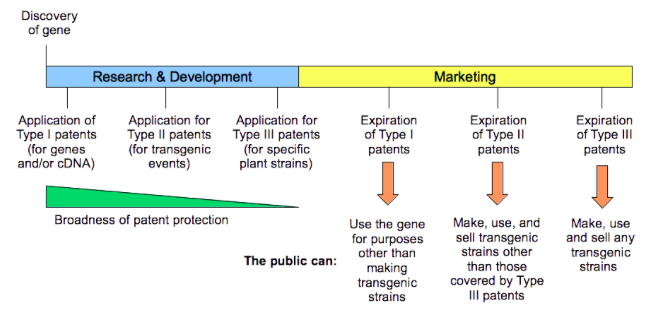Not Just another ePortfolios site
Patents on Genetically Modified Organisms(GMOs)
09/19/2016 • Mahmoud
Patents, whether on new crop varieties or biotech procedures, allow the creator of the technology the opportunity to commercialize their innovation and to obtain a return on their investment of time and money.
In 1930, Congress passed the Plant Patent Act, which established patent rights for breeders of new varieties of many propagated plants. Since then, the act has also incorporated plants produced from modern biotechnological methods, such as integration of foreign DNA into plant genomes.
The number one reason why some refute the legitimacy of GMO patenting is for the reason that they believe a GMO is not an invention. They argue that GMO are constantly creating and recreating, and to treat GMO as a corporate invention and grant corporation patents on GMOs violates ethics or patent law itself.
However for this blog I would like to argue two points to counter the belief that GMO patenting is illegitimate.
The discovery, development, and authorization of a new GMO plant costs $136 million on average [1], which company would be willing to make such investment without a period of exclusivity and profitability granted? The ability to secure intellectual property, with respect to plant-related inventions is common in most developed countries. Patents encourage and reward innovation. If plant breeders were not able to protect the plant varieties they develop from unauthorized reproduction, there would be less incentive for them to develop improved plant varieties.
Second, plant patents have a patent term of 20 years from the initial filing, so GMO patents protect a marketed product for about 15 to 20 years after the time of product development (see Figure 1)
Figure 1. The timeline of typical transgenic GMO patents.
After a patent expires, the invention becomes public knowledge to other companies, farmers, and other interested parties. This free access allows studies of the underlying genetic design and can be utilized by anyone to develop improved versions of the GMO. This eventual free access is one way in which GMOs developed by private companies could bring about public benefit.
The US is a leading country in biotechnological innovation, and the number of biotech patents issued in the US has been increasing steadily in the past few years [3]. I believe with a legal system that grants patents proper coverage, more biotechnological innovations will come to light.
References
- McDougall P. The cost and time involved in the discovery, development and authorisation of a new plant biotechnology derived trait (2011).
- GeneticLiteracy. “Challenging Myths: Yes, Seeds That Grow Organic Food Are Often Patented | Genetic Literacy Project.” Genetic Literacy Project. N.p., 2015. Web. 19 Sept. 2016.
- USPTO Patent Technology Monitoring Team. Patent Counts by Class by Year, 1977 – 2014. Data of Class 435: Chemistry: Molecular Biology and Microbiology.
Comments
Leave a Reply
You must be logged in to post a comment.
This is a good argument.
One of the big worries people have about
GMOs in general is the idea that huge corporations are in control. Would you say that is one of the reasons some people don’t think GMOs should be patented? If so, do you have a way to alleviate or at least respond to that worry?
Interesting blog! You had a very logical argument and avoided bias through out the writing.